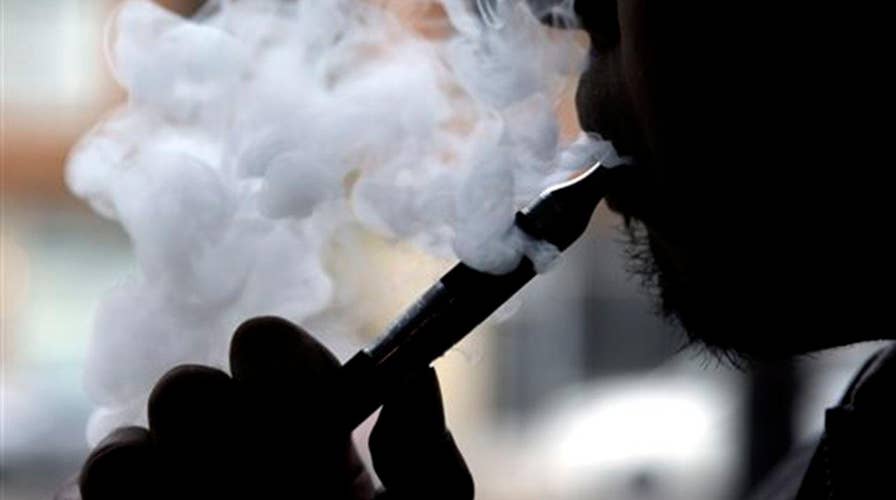FDA investigates more than 120 cases of people having seizures after vaping
Dr. Marc Siegel says vaping is a 'public health epidemic.'
More than a dozen teens in the Midwest who reported vaping have been hospitalized with lung issues, stumping doctors who are searching for what exactly is sickening them.
The Minnesota Department of Health announced Tuesday four cases of young people at Children's Minnesota with “severe lung injury” possibly tied to vaping. The cases were announced days after Illinois health officials reported six cases and at least 12 were confirmed in Wisconsin, state health officials said. There are more under investigation.
“These cases are similar to lung disease cases recently reported in Wisconsin and Illinois, though it is too early to say whether they are connected,” the Minnesota Department of Health said.
Patients are reporting similar symptoms – shortness of breath, chest pain, cough, and vomiting in some cases – and some have been admitted to the intensive care unit (ICU). Teens across states reported using vaping devices for both nicotine and THC, the psychoactive ingredient in marijuana that produces the “high” sensation, prior to their hospitalization.
In Minnesota, specifically, doctors at first thought the teens had some sort of respiratory infection – possibly pneumonia – but ruled this out after they failed to improve with treatment. In fact, according to NBC News, many of the teens treated for a respiratory infection got worse, not better.
“We are deeply concerned by the severe cases of lung injury associated with vaping that we are currently seeing,” Dr. Emily Chapman, chief medical officer at Children’s Minnesota, said in a news release. “These cases are extremely complex to diagnose, as symptoms can mimic a common infection yet can lead to severe complications and extended hospitalization. Medical attention is essential; respiratory conditions can continue to decline without proper treatment.”
In Wisconsin, Dr. David D. Gummin, medical director of the Wisconsin Poison Center, and professor and chief of medical toxicology at the Medical College of Wisconsin, told The New York Times officials “have no leads” to a specific substance that’s causing respiratory issues “other than those that are associated with smoking or vaping,” he said.
VAPING AMONG ILLINOIS TEENS POSSIBLY TIED TO INCREASE IN HOSPITALIZATIONS, HEALTH OFFICIALS SAY
The negative health effects associated with cigarette and cigar use have long been documented, leading to a decline in both among teens in the U.S. in recent years.
In 2018, for example, the Centers for Disease Control and Prevention (CDC) reported roughly 1 in 50 – about 1.8 percent – of middle school students said they smoked cigarettes in the past 30 days, down from 4.3 percent in 2011 and a drastic decrease from 36.4 percent in 1997 when rates “peaked after increasing throughout the first half of the 1990s,” according to the American Lung Association.
But the same is not true for e-cigarette use. In 2018, nearly 1 of every 20 middle school students (4.9 percent) reported using electronic cigarettes in the past 30 days. That's an increase from less than 1 percent in 2011.
“These cases are extremely complex to diagnose, as symptoms can mimic a common infection yet can lead to severe complications and extended hospitalization."
Last year, the Surgeon General of the United States, Jerome Adams, declared vaping among American teens an “epidemic."
"This is an unprecedented challenge,” Health and Human Services Secretary Alex Azar said in response at the time.
The health issues – both short and long term – of e-cigarette use are not well understood, and the U.S. Food and Drug and Administration (FDA) does not require the manufacturers of e-cigarette devices to list all the ingredients in them.
“The risk here is that if people are presenting to hospital emergency rooms or urgent cares, they either may not think of vaping as something that is threatening and may not include it in their history,” Chapman told The New York Times. “Or if asked directly, they may not be comfortable sharing that.”
CLICK HERE TO GET THE FOX NEWS APP
A recent study from Yale University and Duke University found the e-cigarette liquid in Juul devices contain chemicals known as acetals. Acetals, according to the researchers, could cause lung irritation.
Separately, the FDA announced last week it's investigating 127 reports of seizures occurring after vaping.
“The truth of the matter is, we have so little experience with vaping, relative to the experience we have with cigarettes and cigars. Recall how long it took us to figure out that cigarettes were linked to lung cancer,” Chapman added. “There is so much we don’t know.”

